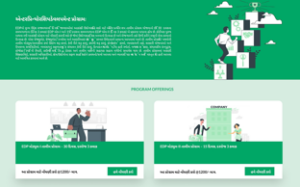The manufacturing industry is constantly changing and evolving due to irregularities in global, economic, and policy decisions. The recent Coronavirus outbreak has not just claimed millions of lives but has also raised concern and economic hardships for businesses across the globe. One of the worst hit segments from COVID-19 is the manufacturing sector with productions getting halt, factories shutting down, rising demand for only essentials and changing consumer buying preferences.
The current global meltdown due to the pandemic is causing a need for acceleration and hence the need for digital transformation is now more than ever. Today every organisation needs to get digitized and adopt learning and development for the workforce of the manufacturing industry to help them rebound in a post COVID world.
Manufacturers face difficulties from transforming themselves digitally and developing themselves due to a lot of reasons, and one of the most important of them is difficulty in upskilling the entire workforce. Digital transformation will drive crucial improvements in how the manufacturing sector functions and betters the manufacturing process. Adopting digital learning will bring about a change and influence everything from workers, high ranking employees, goods, services and procedures.
Challenges faced by the manufacturing sector in implementing learning and development:
- Expensive training:
Employees in the manufacturing industry are not just limited to the worker but consist of various roles, it is expensive to organise training for varied roles.
- Time Consuming:
- Chaotic and unorganised training:
Manufacturing companies often are based out of various locations and arranging and coordinating multiple venues can get pretty chaotic. Hence, providing individual training does not seem to be feasible and cost-effective for most of the manufacturers.
- Lack of Scalability:
Along with the above challenges, organisations also cannot be sure whether each employee received the same quality of training or registered the same information. On the other hand, online courses don’t require special locations or training schedules. Which makes it easier to conduct learning and development sessions.
The conventional classroom learning is not the best approach in terms of costs, effectiveness, and scalability. This has become more relatable as in physical attendance is now not possible due to social distancing and other restriction.
Learning and development in the Manufacturing sector can be easier with curated content and pass it to the workers and employees.
Rather than investing a lot of time and financial resources, employees can be given regular training to hone their skills over a period of time and apply it simultaneously in the administrative functions. In such a scenario, adoption of latest technologies like e-learning is helpful for the development of the manufacturing sector.
The flexibility makes it easier to understand for the employees and enables them to learn on-the-go, get constant assistance, solves their doubts, helps work on their weaknesses to turn them into strengths. Digital learning is the new way of coping with the needs of the manufacturing sector of tomorrow. Speed and accuracy are the key drivers that make learning and development a must for the highly competitive and evolving manufacturing sector.
Results of a Digital transformation have brought along favourable returns on business undertakings in the manufacturing sector. It has led to faster, cost-effective procedures, better quality manufactured products, enhanced worker and employee experience. There is also the advantage of learning on the go with the introduction of e-learning modules on mobile applications. App based learning is a compact cross-platform solution and allows 24*7*365 access to the content.
Cognigix designs and delivers end-to-end customised digital learning solution with an aim to create a positive impact in the manufacturing industry with their learning and development services. Digital learning is an intricate process that is built with several components that include learning architecting, content digitisation and optimisation, online delivery app and learning adoption. L&D professionals in the manufacturing institutions can upgrade their personnel’s, and workforce’s skills like interpersonal communication, production, marketing, sales, customer service etc. with the help of Cognigix solutions.





